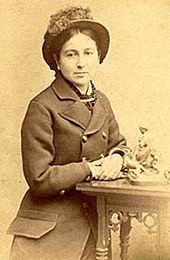Susette La Flesche
Susette La Flesche , even Inshta Theumba or Bright Eyes called (Bright Eyes) (* 1854 in Bellevue, Nebraska ; † 26. May 1903 in Omaha - Reserve in Nebraska), was a reformer, author and lecturer who spent her whole life for used the human rights of the North American Indians. Her father, Joseph La Flesche, was the son of a French trader and an Omaha Indian, and her mother, Mary Gale, was the daughter of an Army doctor and an Omaha Iowa woman.
Joseph La Flesche, or Iron Eyes, was chief of the Omaha, a Nebraska Indian tribe, and lived as a traditional Indian, but he was convinced that the Omaha should adopt the culture of the whites. Even so, he initially raised his children at home according to the Omaha traditions. However, they later received training at the Presbyterian Mission School on the reservation where they learned to speak and write English. Susette and two of her sisters were then sent to a private secondary school in Elizabeth, New York . Upon graduation, Susette returned to the reservation and became a teacher at the state-run Omaha Indian School.
In 1878 Susette and her father went on a private trip to the Indian territory after hearing of the problems of the Ponca living there . The Ponca, closely related to the Omaha, had been forcibly relocated from their tribal lands last year and suffered from disease and famine. The prevailing conditions there were the trigger for Susette's later activities, with the aim of achieving more justice for the Indian population. In 1879 she wrote a petition in the name of the Omaha and published the emergency situation among the Ponca, which had arisen as a result of wrong decisions by the government authorities.
Together with Thomas Henry Tibbles , a reporter for the Omaha Herald , Susette managed to free a group of detained Ponca under Chief Standing Bear who were captured by the military after their return to Nebraska. Susette was a court interpreter in the Standing Bear case. The court ruled in favor of the Indians, a ruling that caused a sensation at the time and set a precedent for the civil rights of North American Indians. Susette came to be known as Bright Eyes . Shortly thereafter, Susette, accompanied by her brother Francis La Flesche and Chief Standing Bear, went on a trip to the big cities in the east, including New York and Boston , to give lectures against the government's Indian policy, combined with the demand that the northern tribes be defeated to allow return to their tribal areas from Indian territory.
In July 1881 she married Thomas Tibbles and soon afterwards the couple went on an extensive trip through North America and Great Britain, during which they drew attention to the plight of the North American Indians with lectures and newspaper articles. Their work secured the enforcement of the Dawes Act in 1887 , which was believed to improve the living conditions of Indians. From 1893 to 1895 the Tibbles lived in Washington, DC , where Thomas worked as a newspaper correspondent.
The Tibbles spent most of the following years in Bancroft, on the Omaha reservation, despite owning a house in Lincoln , Nebraska. She died on May 26, 1903 at the age of 49 and is considered the first woman to stand up for the rights of indigenous people.
Individual evidence
Web links
| personal data | |
|---|---|
| SURNAME | La Flesche, Susette |
| ALTERNATIVE NAMES | Inshta Theumba; Bright eyes |
| BRIEF DESCRIPTION | American reformer, author, lecturer, and human rights activist |
| DATE OF BIRTH | 1854 |
| PLACE OF BIRTH | near Bellevue, Nebraska |
| DATE OF DEATH | May 26, 1903 |
| Place of death | Bancroft, Nebraska |
